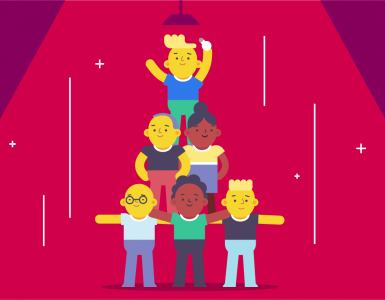The working world is changing. And employees know that. But what’s changing goes beyond the ever-growing debate of whether employees should physically return to their workplace.
With the growth of Artificial Intelligence (AI) tools, workplaces are adapting to accommodate the need for new skills, demonstrating the necessity for professional development and coaching in the workplace.
While some may believe AI removes positions, it’s doing the opposite. It’s created jobs and skill sets that haven’t existed before, forming a new landscape for the digital world. The problem isn’t that AI is taking jobs, but that workers are not yet ready for the roles that AI has created.
According to the University of Phoenix’s Annual Career Optimism Index of 2022, 40% of those surveyed said they “worry their job skills will become outdated because of advancements in technology such as automation, artificial intelligence, and robots.” These workers know that the time for upskilling is now. More than half of those surveyed said they must learn new skills within the next year to continue their careers.
And they want to work with employers that recognize that need and offer opportunities to challenge themselves and help them step into the newly-created roles. 68% of those surveyed said they would stay with their employer throughout their career if the employer provided opportunities to upskill.
Professional development is essential for retention, but it’s costly and intimidating for workers.
What is group coaching, and why does it work? Let’s get into how this form of coaching can help your staff upskill.
What is group coaching?
Unsplash.com
Group coaching is a type of professional development where a coach works with a small group to help them learn new skills and reach their goals. During one-on-one coaching, only one employee works with the coach and receives their attention. With group coaching, all members have a common goal. The coach may set aside time to work with each member individually, but they generally meet and work as a group.
What does group coaching look like?
Group coaching can look different depending on the environment. For example, outside the workplace, you may see group coaching as an online course where one coach works through presentations and provides activities to their subscribers.
Group coaching may be more nebulous, with a larger group of people working through the content on a website and coming together to chat about the work, with the content’s creator chiming in to assist.
But in the workplace, group coaching typically involves one expert guiding a group of coworkers through lessons. If you work in an office setting, you might set aside a standard meeting time when the coach and group members can meet in person. Or, if you’re remote, you might set up a video call for presentations and use team collaboration tools to work on activities together.
Ultimately, the main aspect of a group coach that’s always necessary is that everyone in the group is working toward a common goal. That goal helps guide the creation and focus of the coach’s presentations and activities.
Group coaching may be for one team at a time. For example, you might have your company’s teams work in a separate group coaching session. But because group coaching centers around a common goal, you may find that cross-team group coaching is just as beneficial, if not more.
You can survey your employees about what skill sets they want to work on and create groups for coaching based on their answers. This step can help you harness more diverse skill sets on each team and encourage cross-team collaboration.
What are the benefits of group coaching?
1. Prevents silos
Your company is looking to adopt a new AI tool. You have assigned one person as the expert on the application. They know all the ins and outs of how to use it.
But that one expert is the only person who knows how to use it. As a result, the rest of your employees continue to work on more time-consuming processes without realizing how the AI tool could benefit them.
Without realizing it, you’ve created a knowledge silo. Unfortunately, silos are a common part of many workplaces. In addition to knowledge silos, you may also have data silos. One team may store their essential data using one application, while another group may keep theirs somewhere else. All the while, they may not realize that they could benefit from each other’s information. The lack of oversight over each other’s data may also diminish the information’s quality. If these teams aren’t working together, your company may not be using the data optimally.
Group coaching can help stop silos in their tracks. By putting together a group of people who want to reach common goals, you can help them develop essential skills that benefit the whole company.
If you pulled together a group to learn how to use the new AI tool, you would no longer have the issue of just one person who could utilize it. Ultimately, you would save time and resources by allowing more company members to access a tool that would make processes more manageable.
Organizing your group coaching around a common goal rather than simply creating groups according to teams can also facilitate more learning throughout your company. For example, if someone from your marketing, customer success, sales, and software design teams wanted to learn how to use the AI tool, they could bring those learnings back to their groups, spreading the knowledge and further helping the company.
2. Allows collaboration and learning from each other
An expert is an essential part of group coaching. But the group doesn’t just benefit from one person. They also learn from each other.
The coach isn’t just a coach. They are also facilitators. They may teach the group as experts, but they also should facilitate discussions among the group and create activities to promote collaboration.
Say you organized a group coaching session for your newest sales representative. You should develop activities such as researching prospects and developing lead-generation strategies together. In addition, you might have them practice sales calls with each other.
While the coach may be able to offer guidance, the reality is that every person in the group also has something to offer. Each comes with their own experience and background, which they can use to assist each other.
Perhaps one sales representative learned a great tip about engaging a potential customer from their previous company’s sales team lead. They can bring that strategy into the discussion, which their fellow sales representatives can use during their sales calls.
Beyond their experience, working as a team can also help each other see different points of view and learn different problem-solving techniques. For example, if someone struggles to understand a concept, another group member may hold the key to offering an explanation they can comprehend.
3. Develops camaraderie
Beyond collaboration, group coaching also helps coworkers develop trust in each other. By working towards a common goal, the group members can learn who their coworkers are. Ultimately, the time spent together helps them see each other in a new light.
This new camaraderie is an especially valuable part of cross-team group coaching. Generally, a sales team member is likely to spend more time with someone on their team than someone on another team. As a result, most meetings they attend will be with their group; they likely sit around people who also do sales; and they generally know their team dynamics better than their other coworkers.
While doing cross-team group coaching is one way to help prevent silos, it’s also beneficial for developing camaraderie across your company. Trust and fellowship create a healthier, happier, and ideal work environment where people feel listened to and supported, even beyond their team’s boundaries.
4. Diminishes intimidation
No one knows all the answers. But a part of coaching is questioning your employee and asking them to think about solutions. In addition, you want them to develop their problem-solving skills, which means that you can’t just provide them with answers all the time.
But being questioned one-on-one can be intimidating and the opposite of what you want from professional development. You want your employee to come out of professional development feeling more confident and ready to tackle new challenges. But not knowing the answers during one-on-one questioning may make them feel less self-assured.
Group coaching prevents all the attention from falling on one person. During individual coaching, the one person receiving the coaching may get their coach’s undivided attention, but that’s not always a good thing. In a group setting, each member won’t feel they need to know all the answers. They can offer solutions, but they can also spend time listening to coworkers’ responses.
Listening is also part of what makes group coaching so beneficial. By hearing their coworkers’ thought processes, they can develop their listening and retention skills, while also honing the skills they initially came to group coaching to form. And because they’ll feel less intimated, they can focus more on the task rather than being stuck in their heads.
5. Fosters a culture focused on learning
By investing in group coaching, you’re showing your employees that you care about their growth. In a time when people are greatly concerned about upskilling, you want to create a workplace where your employees know that they will continue to advance their skills and, therefore, their careers.
By fostering a culture of learning, you’re demonstrating to your employees that you value them and want to help them face the challenges that may arise as the working world adapts to new tools and technologies. In addition, as the modern working world changes, legacy positions may become obsolete.
But new roles will replace them. Upskilling is one part of the puzzle, but so is reskilling, as your employees may need to develop entirely new skill sets for these roles. Rather than hiring new workers, you can invest in your current employees’ future through professional development, like group coaching.
Your employees want to learn, so it’s up to you to provide them with opportunities. Group coaching helps you develop a company filled with employees honing their skill sets, both professionally and interpersonally. These group members learn from their coach, but they also learn from each other. When you make learning a part of your company values through group coaching, you’re setting your company and each worker up for success.
Are you ready to pump up your group coaching?
Employees are looking to upskill right now. And they’re willing to look for companies that offer the opportunity to develop new skills if their current employer doesn’t.
If you want to retain quality workers, you have to retrain them. With the digital landscape changing constantly, the modern workforce requires new skills.
Investing in professional development is vital to keeping your employees feeling supported, but group coaching goes beyond professional development. With group coaching, you can train more people at once and allow them to learn from an expert in the skill set they want to develop.
But through group coaching, each member also learns from each other. They also hone their interpersonal skills and form bonds with people they may not have spent much time with otherwise.
Through working with new people, you can also help cut down on the development of silos throughout your company. And by using group coaching instead of one-on-one coaching, you can also keep the intimidation levels down, making your employees better, more confident learners.
Learning is precisely what you want to keep at the forefront of your company’s culture. Your employees want to learn. And they want to know that you care about developing their skills and knowledge. A learning culture benefits every aspect of your company and makes your business more likely to be ready to embrace whatever the future holds. As long as you offer opportunities to keep learning and growing through professional development, like group coaching, you’ll be able to prepare your employees for every challenge that comes their way.











Add comment